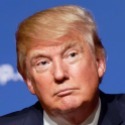
President Trump will attend a White House conference focused on 5G technology that is scheduled to be held roughly a month from now, according to a top administration official.
National Economic Council Director Larry Kudlow announced the conference Friday, according to a report from Reuters. He said companies such as Samsung would attend the event.
Details on the conference remain scarce. Officials from the White House Office of Science and Technology Policy – presumably the administration's department that would take the lead in such an effort – did not immediately respond to questions about the event. A number of top telecom officials in Washington were not able to provide any information about the planned conference.
The FCC confirmed that the White House's conference is not related to the "Forum on 5G Virtualized Radio Access Networks" the agency plans to host on Thursday, March 26.
Another 5G push by Trump
If Trump does attend the upcoming event, it wouldn't be the first time for the president to address next-generation wireless technology. In his first year as president, he met with top executives from Sprint and AT&T to discuss issues including 5G and small cells. He also later issued a presidential memorandum seeking government spectrum for 5G.
And in 2018, the White House hosted a "5G Summit" that Trump did not attend but that Kudlow and Michael Kratsios, the White House's CTO, did.
However, Trump has been criticized by Democratic and Republican lawmakers for taking a fractured approach to 5G policy. "Without a national strategy, facilitated by a common understanding of the geopolitical and technical impact of 5G and future telecommunications advancements, we expect each agency will continue to operate within its own mandate, rather than identifying national authority and policy deficiencies that do not neatly fall into a single department or agency. This fractured approach will not be sufficient to rise to the challenge the country faces," a group of Senators wrote to Trump.
Likely in response, Trump recently named Robert Blair as his new Special Representative for International Telecommunications Policy, a position in which he will be responsible for supporting the administration's 5G efforts. Blair – who joined other Trump officials in defying subpoenas related to the House's impeachment of Trump – will work with Kudlow in the role. It's worth noting though that Kudlow appears set to continue spearheading Trump's 5G efforts considering he announced the White House's forthcoming 5G conference.
Plenty on the agenda
Attendees to a White House conference on 5G will have much to discuss. Perhaps the biggest issue is the Trump administration's ongoing campaign against China in general and the country's 5G vendor, Huawei, specifically. According to the Associated Press, a top cybersecurity official at the US State Department said this week that the US will not be able to share top-level information with countries that choose "untrusted" vendors, such as China's Huawei.
US government officials have argued for years that the Chinese government can use Huawei's equipment for spying, an assertion that Huawei has loudly denied. Trump administration representatives in recent years have been urging US allies to ban Huawei equipment, with mixed results.
In recent weeks, a number of Trump officials have floated dueling proposals aimed at blunting Huawei and China in the 5G arena. US Attorney General William Barr suggested recently that the US government purchase a controlling stake in either Nokia or Ericsson for access to secure 5G equipment.
But that proposal was positioned as a direct and public counter to one floated just a few days prior by Kudlow. Kudlow suggested the US government invest into software developed for 5G by US-based companies, a possible nod to the trend toward "open RAN" technologies in the wireless industry.
Neither Kudlow nor Barr made any mention of the smaller US wireless network operators that already use Huawei equipment. They also didn't address legislation that would divert up to $1 billion in US government money to replace that equipment. And neither brought up the possibility of a government-financed 5G network, another proposal tied to the Trump administration.
Other topics that could come up during a White House-sponsored conference on 5G include midband spectrum and the digital divide. Already the FCC has proposed allocating up to $20 billion in government money to fund the construction of telecom networks in rural areas, as well as a plan to shift midband spectrum from foreign satellite companies to US 5G providers.
— Mike Dano, Editorial Director, 5G & Mobile Strategies, Light Reading | @mikeddano
Read more about:
AsiaAbout the Author(s)
You May Also Like











